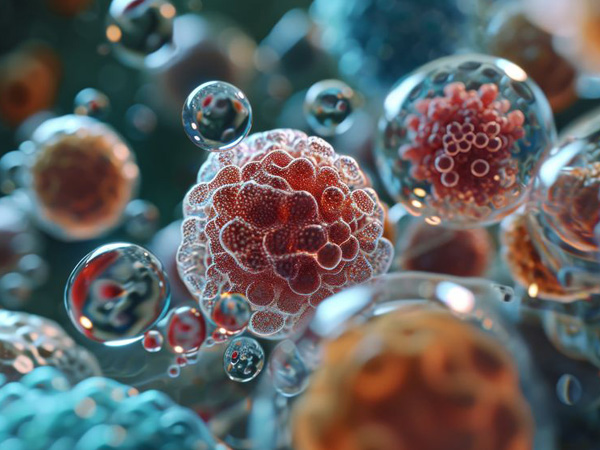News
INTERNATIONAL RESEARCH TEAM UNVEILS IMPACT OF EAST ASIAN GENE VARIANT ON TYPE 2 DIABETES RISK

An illustration of beta cells, which play a vital role in regulating blood sugar levels and preventing complications associated with diabetes.
INTERNATIONAL RESEARCH TEAM UNVEILS IMPACT OF EAST ASIAN GENE VARIANT ON TYPE 2 DIABETES RISK
SINGAPORE — It was earlier discovered that a variation in the PAX4 gene specifically predisposes East Asians to a higher risk of developing Type 2 Diabetes (T2D), increasing lifetime risk by up to 1.8 times1. A new study, now published in the journal Nature Communications, reveals for the first time, how an East Asian-specific PAX4 gene variant, R192H, impact the development and function of beta cells in the pancreas. These beta cells play a vital role in producing insulin, the hormone that regulates blood sugar levels and helps prevent serious complications in diabetic patients.The insights gained from this study pave the way for potential therapeutic interventions and personalised approaches in diabetes prevention and management2, marking a significant step in the ongoing fight against diabetes.
T2D is a chronic metabolic disease that impacts more than 500 million individuals in East Asia. In Singapore, where people of East Asian descent constitute the largest ethnic group (approximately 75 per cent of the population), this PAX4 R192H gene variant is present in 10 per cent of the population3, increasing the risk of diabetes specific to these East Asian PAX4 R192H gene carriers.
Led by Dr Adrian Teo, Senior Principal Scientist at A*STAR’s Institute of Molecular and Cell Biology (IMCB), the international research team consisted of cross-disciplinary scientists from IMCB, National University of Singapore (NUS), Stanford University and the University of Oxford, as well as clinicians from National University Hospital (NUH) and Singapore General Hospital (SGH).
The team used two types of cells — human pancreatic cells and donor-derived human induced pluripotent stem cells (hiPSCs) — to study the role of the PAX4 R192H variant in the development and function of pancreatic beta cells. Comprehensive molecular and genetic analyses revealed that the PAX4 R192H variant result in defective beta cells with lower functionality, leading to reduced insulin production. Collaborating with researchers from Stanford University and the University of Oxford, the team demonstrated that correcting the PAX4 R192H variant through gene-editing techniques can reverse some of these defects.
Additionally, human clinical studies conducted by the NUS, NUH and SGH team found that healthy individuals carrying the PAX4 R192H variant secreted significantly less insulin. This suggests that even before the onset of T2D, these individuals exhibited signs of diminished beta cell function, which are crucial for insulin production and blood sugar regulation.
This study provides new insight into the genetic influences on T2D specific to East Asian populations, which could help advance the development of therapeutic solutions to fight diabetes in Singapore. The research team is also looking into the possibility of diagnosing and editing the PAX4 R192H gene variant to restore insulin content in the beta cells for better patient outcomes.
“This study is the first to reveal how the East Asian-specific PAX4 R192H gene variant impact human pancreatic cells and contribute to diabetes risk. Collaboration with our clinician partners remains key to the success of this research, and these partnerships will aid in identifying better interventions for metabolic diseases such as diabetes. We are now investigating gene therapy to edit the PAX4 R192H variant to assess its potential in mitigating the increased diabetes risk,” said Dr Adrian Teo, Senior Principal Scientist, A*STAR’s Institute of Molecular and Cell Biology (IMCB) and senior author of the study.
“It’s truly exciting to add another piece to our understanding of how diabetes develops in humans. This study is particularly significant as it stems from an observation made over 10 years ago. It highlights the crucial role large-scale genetic studies in Asia play in advancing our knowledge of human biology, emphasising that we cannot fully rely on animal studies to comprehend the causes of human diseases.” said Prof Tai E. Shyong, Senior Consultant, Division of Endocrinology, Department of Medicine, NUH, and senior co-author of the study.
Zaobao
1 The genetic architecture of type 2 diabetes. Nature 536, 41–47 (2016).
2 PAX4 gene delivery improves β-cell function in human islets of Type II diabetes. Future Medicine, 10 May 2024.
3 PAX4 R192H is associated with younger onset of Type 2 diabetes in East Asians in Singapore. Journal of Diabetes and its Complications, Vol 33, Issue 1, 53-58 (2019).
A*STAR celebrates International Women's Day

From groundbreaking discoveries to cutting-edge research, our researchers are empowering the next generation of female science, technology, engineering and mathematics (STEM) leaders.
Get inspired by our #WomeninSTEM
.png?sfvrsn=c3edc68e_6)